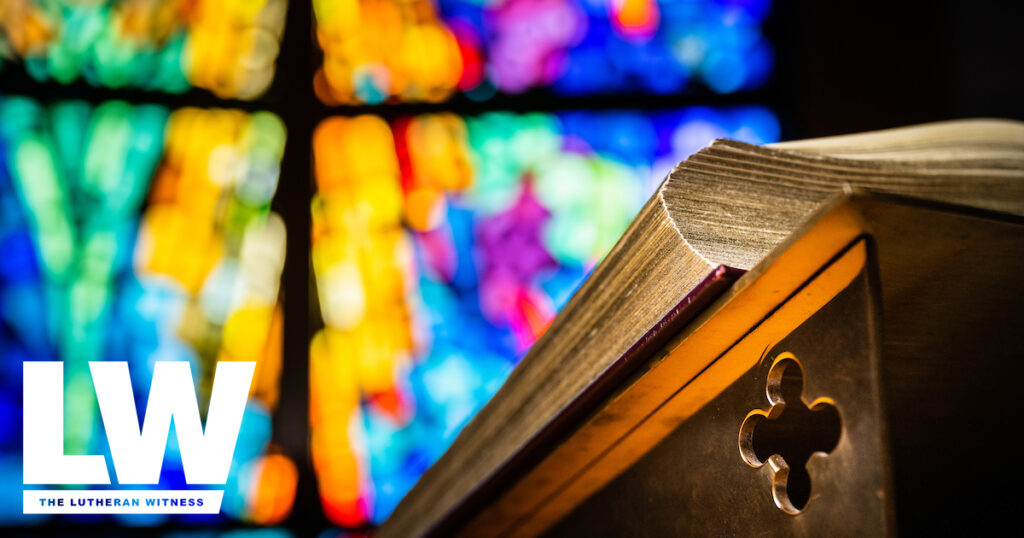Living and working in Leipzig, Germany, it is easy to see and be confronted by the realities of persecution of the Christian Church even as we walk around the beautifully restored and renewed City Center. And so it happened that one day, not long after moving here, we were touring the City Center with family that had come to visit. We were explaining that the current church-like glass structure on Augustusplatz stands where Paulinerkirche (Paul’s Church) once stood on the University of Leipzig’s campus. It was dynamited during the Communist rule of the German Democratic Republic (GDR).
Our son Thomas (who was 5 at the time) was struck but somewhat silent, absorbing it. We explained that the government wanted people’s loyalty, and they knew that to do that, they had to destroy Christianity. They had to make themselves the religion of the people. Later, as we walked through one of the famous passages in the City Center, we came across some banners commemorating Paulinerkirche. They were pictures of the ruins caused by the Communists. Thomas burst into tears. He cried uncontrollably for some time.
Facing the realities of the persecution of other Christians, even historical persecution, is not easy for us, much less our children. It is an emotional and frightening topic, often rife with horrible stories of death, mutilation and fear. We want to turn our eyes and the eyes of our children away from such realities. But these realities cannot be ignored and can even be wonderful teaching opportunities.
On that day, we spoke with Thomas about how the Church is not just a building and that the Lord Jesus Christ sustains the Church and His people no matter what the world may throw at them. Paulinerkirche was just a building. But it represented what those who hate Christians and Christianity will do to try to stifle it.
Persecution occurs when a Christian is deprived of job, livelihood, family, home, citizenship, their place of worship or even their life simply because they confess that Jesus is the Son of God and the Savior of the world. Persecution is a direct result of the Christian’s confession. The older German members and Iranian immigrant members of our congregation here know persecution. When you speak with the German members, you hear stories about how going to church during the GDR was a risk. In one town, there was a man whose sole job was to stand at the top of the hill and count parishioners as they went into the church.
For the Iranians, the persecution is even stronger. While many come to Germany and flee Iran for other reasons (such as political asylum), once they become Christians, their lives, as well as those of their families still in Iran, become even more dangerous. For many, their ancestors converted to Islam on pain of death centuries ago, and now that they have returned to the faith of those ancestors, they face hardship, poverty and isolation from their families in Germany and the threat of death if they return.
So how do we help our children, Sunday School students and Lutheran school pupils understand persecution?
- Use the Scriptures. Introduce your children to the concept of persecution by teaching about texts such as Stephen’s stoning in Acts 7.
- Include them in discussion of current events. Of course, for the very young, protect them from graphic details or pictures, but be honest about the fact that many Christians die for their confession, using current events as an opportunity to discuss this important part of the Christian life.
- Pray with your children for those who face this persecution. You can also discuss ways to help persecuted Christians in other lands, such as donating money to the Global Mission Fund of the LCMS or to other organizations that serve asylum-seekers in the U.S.
- Teach your children that Jesus tells us in Matt. 5:10–11 and other passages that we will face persecution because we confess His name. But in this, we only look like our Savior, who also suffered. As they persecuted Him, so they will do to us.
- Encourage your children to confess the faith even in the face of taunts and pressure from friends because when they do, they stand in solidarity with those around the world who confess faith in Christ despite the fact that it means loss of their homes, friends, families, jobs or lives.
Jesus’ persecutors did not have the last word, even when they put Him to death. And persecution is not the last word for us either. God’s Word is! God raised Jesus to new life, just as we will be raised. So we proclaim the faithfulness of Christ Jesus, who confesses us before His Father in heaven (Matt. 10:31–32).
Pray with your child: Lord Jesus Christ, You know the pain of persecution at the hands of Your enemies. Be with all those who suffer persecution for the faith; strengthen them that they may stand firm in their confession, deliver them from persecution and give them the hope of the resurrection in the face of fear and death. In Your name we pray, Amen.





